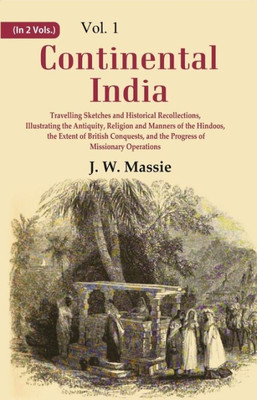Continental India: Travelling Sketches and Historical Recollections, Illustrating the Antiquity, Religion and Manners of the Hindoos, the Extent of British Conquests, and the Progress of Missionary Operations Volume 1st(Paperback, J. W. Massie)
Quick Overview
Product Price Comparison
About The Book: The two volumes of "Continental India" are a collection of travelling sketches and historical recollections that provide insight into the antiquity, religion, and manners of the Hindoos, as well as the extent of British conquests and the progress of missionary operations. The author has gathered information from personal travels and local observations, as well as from original and authenticated records, such as the archives of the Asiatic Society and the works of various historians and writers. The second volume focuses on the condition of women in India and how it reflects the country's religious beliefs. The author describes the plight of widows and the Hindoo institutes that govern the lives of women, including their employments and influence. The controversial practice of immolation, or Suttee, is discussed in detail, as well as the story of Muchta Ebya, a princess. The author also provides insights into the ceremonies surrounding female infancy and betrothal, marriage festivals, and domestic life. The tragic story of a wife's desolation after her husband's death and the preparations for her funeral pyre are also explored, along with the process of human sacrifice. The author criticizes the carelessness of merchants and warriors towards women and highlights the importance of missionary benevolence. The author also discusses the influence of British residents and their concubinage, as well as the character and influence of English females in India. Finally, the author observes the permanency of Indian society's forms and the progress of modern improvements for education and other areas. The volumes provide a comprehensive and valuable account of India's culture and history, as well as the role of British influence and missionary work. About The Author: James William Massie (1799ŌĆō1869) was a Scottish nondenominational minister and missionary to India. Born in Glasgow, Scotland, he was ordained in 1822. He then began his ministry as a missionary with the London Missionary Society in India - first in Madras from 1823 to 1825, and then Bangalore from 1825 until around 1827. From 1828 until 1830, he tried to establish a Congregational chapel in Dunfermline, Scotland. Massie ministered in Dublin from 1831 until 1836, and was then minister of Perth Congregational Church in Scotland until 1841. He was in Salford, England, until 1848, and then moved to London to become secretary of the Home Missionary Society.

